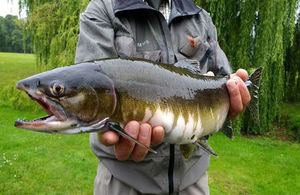Anglers urged to report non-native salmon catches
Pink salmon have been spotted in North East waters

Pink salmon originate from the northern Pacific Ocean
The Environment Agency is urging anglers and commercial fishermen to report unusual catches after a non-native pink salmon was caught in North East waters.
The fish was captured in a commercial net, close to the mouth of the River Tyne in early June. Since then, there have been further unconfirmed reports of pink salmon being caught in coastal nets in the North East.
Around 200 non-native pink salmon were caught in waters off the North East and Yorkshire coast in 2017 and by anglers in the rivers Tyne, Coquet, Wear and Hull, but this is the first confirmed catch of 2018. Further afield, anglers have confirmed catches in rivers in Scotland and in western Ireland.
Pink salmon (Onchorhyncus gorbuscha), also known as humpback salmon, originate from the northern Pacific Ocean.
Millions were stocked in the White Sea region of north Russia from the 1950s until the early 2000s to develop a net fishery. As a result, some have established self-sustaining populations in rivers and coastal areas in Russia, Finland and northern Norway. These populations now appear to be expanding. This is the most likely origin of the pink salmon recently caught in the UK and Ireland.
Non-native species have the potential to disturb the natural balance of our environment so, the Environment Agency is collecting data on sightings of pink salmon so officers can monitor and review any potential impact on biodiversity.
The Environment Agency’s Jonathan Shelley said:
The high numbers of pink salmon in our waters in 2017 was quite unusual. Now we’ve seen the first pink salmon caught in 2018, we’re asking anglers and netsmen to make us aware of any other pink salmon they catch.
I’d urge them to contact us if they see any non-native salmon in the waters, with a date, location and if possible a photograph, which would really help us identify them and build up a picture of where they are.
At this stage we don’t think there’s likely to be a major impact on wild fish stocks, but it is important we build up as comprehensive a picture of the number and distribution of pink salmon arriving, so we can take any necessary action.
Fishermen who hold a salmon licence and catch pink salmon are asked not to return the fish to the water if they are confident in their identification. Instead they are asked to dispatch them humanely and make the fish available to the Environment Agency for inspection and further analysis. If this is not possible, they are asked to send a sample of the scales. Coarse and trout anglers who catch pink salmon are asked to retain them in a keep net if possible and alert the Environment Agency to arrange collection. If this is not possible, the fish should be released.
Data collected will help the Environment Agency, fisheries researchers and other organisations with an interest in fisheries management in the United Kingdom, Ireland and Scandinavia, better understand how to manage the arrival of pink salmon in the UK.
Anyone with information is asked to contact the North East environmental monitoring team on 0800 807060 or email jonathan.shelley@environment-agency.gov.uk.